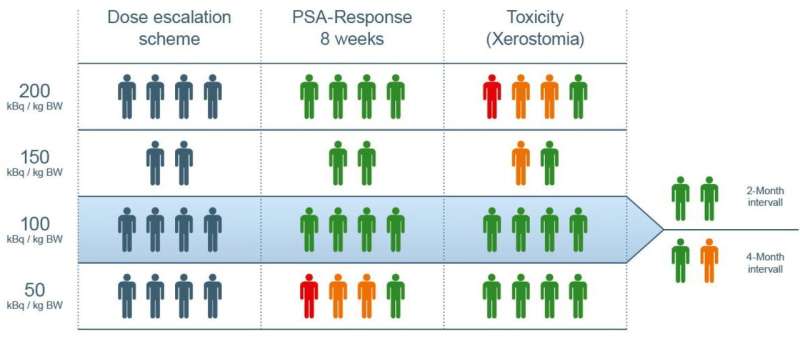New targeted alpha therapy protocol for advanced prostate cancer

Therapy options are limited for men with advanced-stage, metastatic castration-resistant prostate cancer (mCRPC), but a new treatment protocol offers hope. In the featured article of The Journal of Nuclear Medicine's October issue, German researchers report on their recent clinical experience, which establishes a dosing regimen for actinium-225 (225Ac)-labeled targeted alpha therapy of patients with prostate specific membrane antigen (PSMA)-positive tumors. The protocol balances treatment response with toxicity concerns to provide the most effective therapy with the least side effects.
"The idea of targeted alpha therapy is not completely novel," explains Clemens Kratochwil, MD, University Hospital Heidelberg in Germany. "However, in contrast to hundreds of preclinical research reports, the clinical experience is still very limited. Our current results present a milestone with regard to clinical translation, because we could demonstrate how preclinical knowledge can be applied to human beings."
Salvage therapy results show treatment with 100kBq/kg 225Ac-PSMA-617 is tolerated by patients and demonstrates promising anti-tumor response. In addition, it was determined that repeated treatments in intervals of eight weeks may lead to continuing tumor control.
"We developed a treatment protocol that presents a promising trade-off between toxicity and anti-tumor activity of PSMA-directed targeted alpha therapy," says Kratochwil. "However, our current results present only a starting-dose that, on the one hand, has still to be optimized and, on the other hand, needs further studies to evaluate its efficacy. Ultimately, there could be a new treatment modality to improve symptomatic patients and/or prolong survival."
Looking ahead, Kratochwil states, "If PSMA-targeted alpha therapy keeps its promise, it may earn a significant place in therapeutic nuclear medicine. However, it is the nature of all molecular targeting therapies that they can only be effective if the target is sufficiently expressed in the tumors. Thus, molecular imaging by means of PSMA-PET/CT also has an important role as a stratification criterion, and the 'theranostic' concept [combining diagnostic imaging of a biomarker with precise therapy] may be an additional motivation to establish PSMA-PET/CT as a routinely available imaging modality."
More information: Clemens Kratochwil et al, Targeted α-Therapy of Metastatic Castration-Resistant Prostate Cancer with225Ac-PSMA-617: Dosimetry Estimate and Empiric Dose Finding, Journal of Nuclear Medicine (2017). DOI: 10.2967/jnumed.117.191395



















